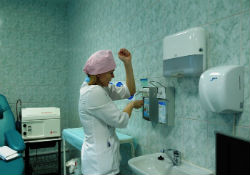Hand hygiene a key defence in Europe’s fight against antibiotic resistance

Russian Nurses Association
Antimicrobial resistance (AMR), and resistance to antibiotics in particular, continues to grow in the WHO European Region and hundreds of thousands of patients die or are considerably affected each year by health care-associated infections (HAI) and diseases caused by germs that are resistant to antimicrobial medicines.
This year’s SAVE LIVES: Clean Your Hands campaign on 5 May uses the slogan “Fight antibiotic resistance – it's in your hands” to highlight the fact that health-care workers and the public have a responsibility to prevent and control AMR and HAI, in turn helping to prevent related complications and deaths.
It is estimated that 7–10% of patients will acquire at least one HAI at any given time under treatment. A large percentage of these are preventable by improving hand hygiene practices and other infection prevention and control measures.
Taking action from many sides
HAI, including those resistant to antibiotics, are among the most common adverse events in health care delivery. Such infections can impact quality of life and lead to serious disease or even death. Action across all sectors of society is required to effectively prevent AMR. The following key recommendations will help prevent the spread of AMR and protect people in the Region from HAI:
- Health workers must clean their hands at the right times (see below).
- Chief executive officers and managers of health facilities need to support hand hygiene campaigning and infection prevention and control (IPC) programmes.
- IPC leaders should champion hand hygiene campaigns and comply with WHO’s “core components” for IPC.
- Policy-makers should stop the spread of AMR by demonstrating national support for and commitment to infection prevention programmes.
Cleaning hands at the right times
Protecting patients against HAI can be achieved by improving hand hygiene at five key moments, preferably by using an alcohol-based rub or by hand washing with soap and water if hands are visibly dirty. The “five moments” for hand hygiene comprise:
- before patient contact
- before preparing and administering injections
- after contact with body fluids
- after patient contact
- after touching patient surroundings.
Reinforcing the importance of hand hygiene through policy-making
Making infection prevention and hand hygiene a national policy priority by aligning and strengthening existing programmes will go far in combating AMR and protecting patients from resistant infections.
National authorities should implement or reinvigorate any or all of the following options according to the new WHO recommendations on core components for IPC programmes:
- establish a national IPC programme linked with other relevant national programmes and professional organizations;
- ensure that any national IPC programme supports the education and training of the health workforce as one of its core functions;
- establish an HAI surveillance programme and networks that include mechanisms for timely data feedback;
- consider hand hygiene as a key national performance indicator providing vital feedback data on health-care practices;
- have a system in place to ensure patient care activities are undertaken in a clean and/or hygienic, well-equipped environment to prevent and control HAI.
Building momentum in the fight against antibiotic resistance
This year’s campaign builds important momentum ahead of World Antibiotic Awareness Week (WAAW), which takes place on 13–19 November 2017. WAAW encourages all countries, health partners and the public to help raise awareness of AMR and to emphasize that we all have a part to play in preserving the effectiveness of antimicrobial medicines.



